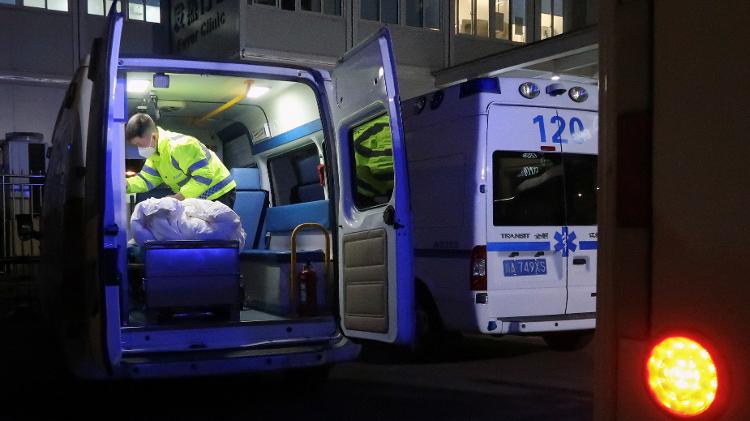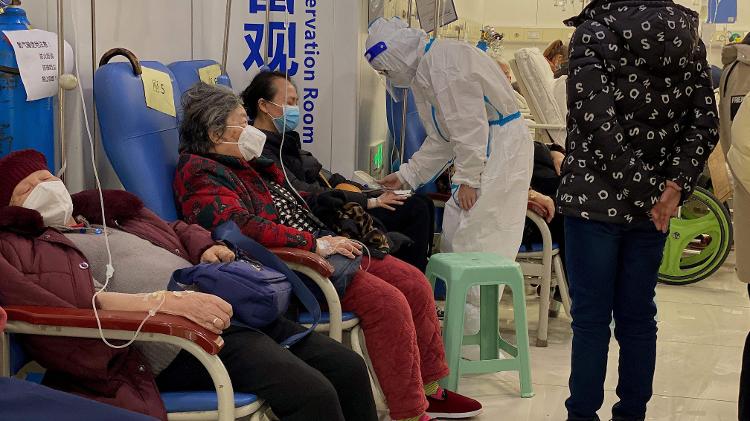Yao Ruyan was walking frantically in front of a municipal hospital in Hebei Province, China, 70 km southwest of Beijing. Her mother-in-law had covid-19 and needed urgent medical attention, but all the nearby hospitals were full. “They say there are no beds here,” he said.
Emergency rooms in small towns and villages southwest of Beijing are overflowing as China grapples with the first nationwide wave of Covid-19. Intensive care units refuse ambulances, relatives of patients are looking for empty beds, and patients are waiting for beds in hospital corridors or lying on the floor.
Yao’s elderly mother-in-law had been sick for a week. First, they went to a local hospital where lung imaging showed signs of pneumonia. However, Yao was told that the hospital would not be able to handle Covid-19 cases. He was instructed to go to hospitals in nearby cities.
On the way from the hospital to the hospital, Yao and her husband saw that all the wards were full. Zhuozhou hospital, an hour’s drive from Yao’s hometown, was a disappointment.
“I’m angry,” Yao cried as he held the lung scans taken at the local hospital. “I don’t have much hope. We’ve been searching for a long time and I’m so scared because he’s having trouble breathing.”
The young go back to work, the old suffer
Journalists from the AP news agency visited five hospitals and two crematoriums in small towns and villages in Baoding and Langfang provinces in central Hebei province for two days. The region was the epicenter of one of China’s first outbreaks after the government eased pandemic control measures in November and December. The area was quiet for weeks as people fell ill and stayed at home.
Many have already recovered. Now, as the virus spreads to other parts of China, markets and restaurants are crowded and cars are honking in traffic. In recent days, headlines in the state media stated that the region was “starting to return to normal life”.
But daily life in the emergency rooms and crematoriums in central Hebei was very different from normal, just a few days before the end of the year. Even as young people return to work and queues at fever clinics shrink, the condition of many infected elderly people in Hebei is critical and this could herald what will happen in the rest of China.
From December 7 to December 24, when restrictions were eased, the Chinese government reported just seven deaths from covid-19, bringing the total number of deaths in the country to 5,241. On the 20th, a Chinese health official said China only counted deaths from pneumonia or respiratory failure in its official death toll from Covid-19.
Experts have predicted between 1 million and 2 million deaths in China next year, and the World Health Organization (WHO) warned that Beijing’s counting system would “understate the actual number of deaths”.
Crematoriums working overtime
At Baoding 2 hospital in Zhuozhou, patients filled the emergency room corridor on the last day of 21. The patients were breathing with the help of machines. A woman was crying when doctors said that someone she loved had died.
At the Zhuozhou crematorium, furnaces are working overtime as workers struggle to cope with the spike in deaths last week, according to an official. A funeral home worker estimates he burned three to four bodies a day before pandemic control measures were relaxed.
“Many people died,” said Zhao Yongsheng, who works at a funeral supply shop near a local hospital. “They’re working day and night, but they can’t burn everybody.”
For more than two hours at the Gaobeidian crematorium, AP journalists observed three ambulances and two vans unloading the bodies. “A lot!” said.
As the government official listened, Ma confirmed more burnings, but said he didn’t know if Covid-19 was involved and blamed the arrival of winter for the extra deaths.
Authorities say they have the situation under control.
Even with models suggesting that large numbers of people were infected and died, some Hebei officials deny that the virus had much of an impact.
“There are no so-called explosions in cases, everything is under control,” Wang Ping, administrative director of Gaobeidian Hospital, said at the hospital’s main gate.
Wang said only one-sixth of the hospital’s 600 beds were occupied, but refused to let AP reporters in. Two ambulances arrived at the hospital within half an hour of the journalists’ presence, and a patient’s relative told AP that they were turned away because the emergency room was full.
patients on the ground
In Bazhou, a city 100 kilometers east of Gaobeidian, over a hundred people filled the emergency room of Langfang 4 hospital on the night of the 22nd.
Security guards tried to organize the crowd as people raced to get in line. When there was no room left in the ward, the patients waited in the corridors. Patients sprawled on blankets on the floor as workers frantically moved stretchers and fans. In one hallway, half a dozen patients gasped on metal benches as oxygen tubes pumped air into their noses.
Over the course of two hours, AP journalists witnessed half a dozen or more ambulances arrive at the hospital’s intensive care unit to pick up critically ill patients and transport them to other hospitals, while cars arrived with dozens of new patients.
A beige van pulled into the intensive care unit and honked frantically for the waiting ambulance. Driver “Walk!” yell. “Come on, come on!” she cried in a panicked voice. Five people pulled a man out of the back of the van and took him to the hospital.
The security guard asked a patient to act, but stepped back when a relative complained. The man in the van lay on the floor amid the doctors running back and forth.
Doctors came in with ventilators. “Can you open your mouth?” ‘ someone shouted, breathing more easily as white plastic tubes were placed on his face.
Others weren’t so lucky. When the old woman’s vital signs disappeared, her relatives around another bed began to cry. A man pulled a cloth over the woman’s face, and they stood quietly before the woman’s body was taken away. Within minutes, another patient had taken his place.
with information from AP
source: Noticias
Mark Jones is a world traveler and journalist for News Rebeat. With a curious mind and a love of adventure, Mark brings a unique perspective to the latest global events and provides in-depth and thought-provoking coverage of the world at large.

